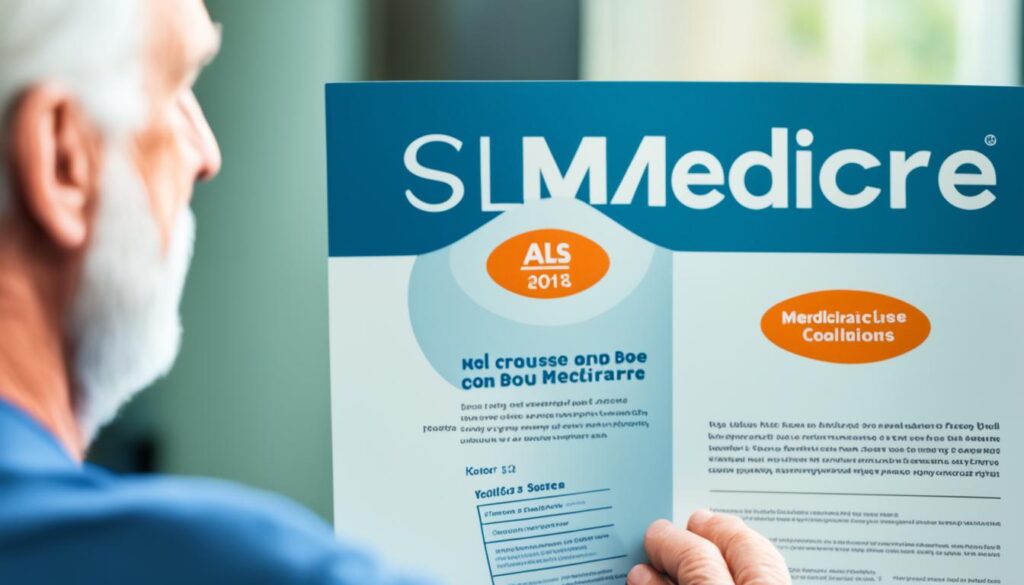Are you aware that Medicare offers healthcare coverage to over 62 million Americans? This accounts for a large percentage of the population who depend on this program for vital medical services and assistance. If you are nearing the age of 65, dealing with a disability, or confronting a severe health issue, it is important to grasp the eligibility criteria for Medicare to guarantee you receive the necessary care.
Key Takeaways:
- Medicare is available to individuals who are 65 or older, have a disability, End-Stage Renal Disease (ESRD), or Amyotrophic Lateral Sclerosis (ALS).
- Part A of Medicare is usually premium-free, while Part B requires a monthly premium.
- Part C (Medicare Advantage) and Part D (prescription drug coverage) have varying premiums and eligibility criteria.
- Understanding the eligibility requirements for each part of Medicare is essential in making informed decisions about enrollment and coverage options.
- Special considerations and factors, such as employer-sponsored coverage and health status, can impact Medicare eligibility.
Who is Eligible for Medicare at Age 65?
When it comes to Medicare, turning 65 is a significant milestone. At this age, individuals become eligible for Medicare coverage, providing them with essential healthcare benefits. However, it’s important to understand the eligibility criteria and qualifications for Medicare at age 65.
Medicare eligibility age: The Medicare eligibility age is 65 years for most people. This means that individuals who are 65 or older automatically qualify for Medicare coverage.
Medicare qualifications: In addition to the age requirement, individuals may also be eligible for Medicare if they are receiving or eligible to receive Social Security or Railroad Retirement Board benefits. These benefits can include retirement, disability, or survivor benefits.
It’s crucial to note that age alone does not guarantee eligibility for Medicare. Meeting the other eligibility criteria, such as receiving Social Security or Railroad Retirement Board benefits, is equally important. Understanding these requirements is essential to ensure a smooth enrollment process and access to the healthcare benefits provided by Medicare.
“Turning 65 is a significant milestone for Medicare eligibility. However, meeting the age requirement alone is not enough. It’s important to understand the other qualifications for Medicare, such as receiving Social Security or Railroad Retirement Board benefits.”
To summarize, individuals who are 65 years or older and receiving or eligible to receive Social Security or Railroad Retirement Board benefits are generally eligible for Medicare. By meeting these requirements, individuals can access the comprehensive healthcare coverage offered by Medicare.
Medicare Eligibility for Individuals with Disabilities
Individuals with disabilities can qualify for Medicare if they have been receiving Social Security Disability Insurance (SSDI) benefits for at least two years. Medicare eligibility for individuals with disabilities is determined by the Social Security Administration based on their definition of disability. It is important for individuals with disabilities to understand the process of enrolling in Medicare and the specific eligibility requirements.

Qualifying for Medicare with Disabilities
Medicare eligibility for individuals with disabilities is based on the receipt of Social Security Disability Insurance (SSDI) benefits. To qualify for Medicare, individuals must meet the following criteria:
- Have a qualifying disability as defined by the Social Security Administration.
- Have received SSDI benefits for at least two years.
It is important to note that individuals with certain disabilities, such as Amyotrophic Lateral Sclerosis (ALS) or End-Stage Renal Disease (ESRD), may be eligible for Medicare before the two-year waiting period.
Enrolling in Medicare with Disabilities
Enrolling in Medicare with disabilities follows a similar process as for individuals who are 65 years or older. Here are the key steps to take:
- Contact the Social Security Administration to determine eligibility and begin the enrollment process.
- Provide the necessary documentation, including proof of disability and SSDI benefits.
- Complete the Medicare enrollment application, either online, by phone, or in person.
- Review and understand the specific Medicare eligibility guidelines for individuals with disabilities.
Understanding Medicare Coverage for Individuals with Disabilities
Medicare provides essential healthcare coverage for individuals with disabilities. Once enrolled, individuals with disabilities have access to the same Medicare parts and benefits as those who are 65 or older. This includes Medicare Part A, Part B, Part C (Medicare Advantage), and Part D (prescription drug coverage).
It is important for individuals with disabilities to review their Medicare coverage options and understand any additional programs or assistance available, such as Medicare Savings Programs or Extra Help for prescription drugs. These programs can help reduce healthcare costs and provide additional support for individuals with disabilities.
By understanding the process of qualifying and enrolling in Medicare, individuals with disabilities can access the healthcare coverage they need. Medicare provides essential support for managing healthcare costs and ensuring access to quality care for individuals with disabilities.
| Benefits | Medicare Part A | Medicare Part B | Medicare Part C (Medicare Advantage) | Medicare Part D (Prescription Drug Coverage) |
|---|---|---|---|---|
| Hospital stays | ✔️ | ✔️ | ||
| Doctor visits | ✔️ | ✔️ | ||
| Prescription drugs | ✔️ | |||
| Additional benefits | ✔️ |
Medicare Eligibility for End-Stage Renal Disease (ESRD)
Individuals with End-Stage Renal Disease (ESRD) may be eligible for Medicare regardless of their age. ESRD is a permanent kidney failure requiring dialysis or a transplant. Medicare eligibility for ESRD requires individuals to apply for Medicare coverage through the Social Security Administration.
Medicare eligibility application for ESRD involves submitting the necessary paperwork and medical documentation to prove the diagnosis of ESRD. The application process ensures that individuals with ESRD can receive the necessary healthcare coverage and support for their condition.
Once the Medicare eligibility application is approved, individuals with ESRD can enroll in Medicare and access the benefits provided by the program. Medicare coverage for ESRD includes dialysis treatments, kidney transplant services, and other medically necessary treatments related to the management of ESRD.

The image above illustrates the significance of Medicare eligibility for individuals with ESRD, highlighting the coverage and support available through the Medicare program.
Understanding the Medicare eligibility for ESRD is crucial for individuals living with this condition. By applying for Medicare and meeting the specific criteria for ESRD, individuals can access the necessary medical care and treatments to support their overall health and well-being.
Medicare Eligibility for Amyotrophic Lateral Sclerosis (ALS)
If you have been diagnosed with Amyotrophic Lateral Sclerosis (ALS), commonly known as Lou Gehrig’s disease, you are eligible for Medicare regardless of your age. Medicare eligibility for ALS is automatic, meaning you don’t need to go through a separate application process. Medicare can provide essential coverage and support to help manage your healthcare needs as you navigate life with ALS.

Living with ALS presents unique challenges, and having access to Medicare can greatly assist in ensuring you receive the necessary medical care and support. With Medicare, you can have peace of mind knowing that important healthcare services and treatments are covered.
Medicare can provide coverage for various ALS-related expenses, including:
- Doctor visits and consultations
- Hospital stays and inpatient care
- Home health services
- Medical equipment and supplies
- Prescription medications
By having Medicare coverage, you can gain access to a wide range of healthcare services and treatments that are crucial for managing the symptoms and complications of ALS.
It is important for individuals with ALS to explore their Medicare coverage options and understand the benefits available to them. Medicare can offer financial protection and peace of mind, allowing you to focus on managing your condition and improving your quality of life. If you have ALS, take advantage of your automatic Medicare eligibility and ensure you are making the most of the benefits that Medicare provides.
Understanding Medicare Parts A and B
When it comes to Medicare, it’s important to understand the different parts and what they cover. Medicare has two main parts: Part A and Part B. Let’s take a closer look at each:
Medicare Part A:
Medicare Part A covers inpatient hospital stays, skilled nursing facility care, hospice care, and some home health care services. For most people, there is no monthly premium for Part A if they or their spouse paid Medicare taxes while working. Remember, Part A helps cover the cost of care when you’re admitted to a healthcare facility.
Medicare Part B:
Medicare Part B is responsible for covering doctor visits, outpatient care, medical supplies, and preventive services like flu shots and cancer screenings. Unlike Part A, everyone pays a monthly premium for Part B. It’s crucial to keep up with your Part B premiums to ensure continued coverage for necessary medical services.
Understanding the eligibility requirements for each part of Medicare is essential. Make sure you meet the necessary Medicare eligibility requirements for both Medicare Part A and Part B to access the coverage they provide.

Table 6: Medicare Parts A and B Coverage
| Medicare Part | Coverage |
|---|---|
| Part A | Inpatient hospital stays Skilled nursing facility care Hospice care Some home health care services |
| Part B | Doctor visits Outpatient care Medical supplies Preventive services |
With a clear understanding of Medicare Parts A and B, you’ll be better equipped to navigate the healthcare system and make informed decisions about your coverage.
Exploring Medicare Advantage Plans (Part C)
Medicare Part C, also known as Medicare Advantage, offers a valuable alternative to Original Medicare (Part A and Part B). These plans are provided by private companies approved by Medicare. Medicare Advantage plans are required to offer the same coverage as Original Medicare, but they may also include additional benefits such as vision, dental, and prescription drug coverage. Choosing Medicare Advantage allows you to have comprehensive healthcare coverage under a single plan.
When considering Medicare Advantage, it’s essential to understand the Medicare enrollment criteria for Part C. The eligibility requirements may vary depending on the specific plan. Some Medicare Advantage plans may require individuals to meet certain age or health conditions, while others may have no specific eligibility restrictions. Before enrolling, it’s important to explore the options available and consider your individual healthcare needs.

By opting for Medicare Advantage, you gain the ability to access a wide range of healthcare services and benefits that align with your specific needs and preferences. These plans offer flexibility, convenience, and often include additional coverage not provided by Original Medicare. However, it’s crucial to carefully review the details and limitations of each Medicare Advantage plan before making a decision.
Understanding Medicare Prescription Drug Coverage (Part D)
Medicare Part D provides essential prescription drug coverage for individuals enrolled in Medicare. This coverage is offered through private companies approved by Medicare, ensuring that beneficiaries have access to necessary medications. Understanding the details of Medicare Part D is crucial for individuals seeking affordable and comprehensive prescription drug coverage.

Medicare eligibility for Part D requires individuals to be enrolled in either Medicare Part A or Part B. Once enrolled in Medicare, individuals can then choose to enroll in a Medicare Part D plan to supplement their healthcare coverage.
Eligibility for Medicare Part D may vary depending on the specific plan chosen. While there are general qualifications for enrollment, such as being enrolled in Part A or Part B, it is important to review the specific requirements of each plan to ensure eligibility.
Formulary and Cost-sharing Requirements
Medicare Part D plans have what is called a “formulary,” which is a list of covered prescription drugs. The formulary determines which medications are covered by the plan and at what cost. It is essential to review the formulary of a specific plan to determine if it covers the necessary medications.
Additionally, Medicare Part D plans may have different cost-sharing requirements, including monthly premiums, deductibles, copayments, and coinsurance. These costs can vary depending on the plan and the specific medications needed. It is crucial to carefully consider the cost-sharing requirements when choosing a Medicare Part D plan.
| Cost-sharing Element | Description |
|---|---|
| Monthly Premium | The amount paid each month to maintain Medicare Part D coverage. |
| Deductible | The initial amount that needs to be paid out-of-pocket before the plan begins covering the cost of prescription drugs. |
| Copayment | A fixed amount paid for each prescription, often dependent on the tier of the medication. |
| Coinsurance | A percentage of the cost of a prescription drug that the beneficiary must pay. |
By understanding the details of Medicare Part D coverage, including the formulary and cost-sharing requirements, individuals can make informed decisions about their prescription drug coverage and find a plan that best meets their needs and budget.
Special Considerations for Medicare Eligibility
In addition to the general eligibility criteria for Medicare, there are several special considerations and factors that can impact your eligibility. It’s important to understand these considerations to determine whether you qualify for Medicare benefits.
Employer-Sponsored Coverage
One consideration is whether you have employer-sponsored health insurance coverage. If you or your spouse are currently employed and have health insurance through your job, you may need to consider how this coverage relates to Medicare eligibility. It’s crucial to review the terms of your employer-sponsored coverage and consult with your employer or a Medicare representative to understand how it may affect your Medicare eligibility.
Creditable Coverage
Creditable coverage refers to health insurance coverage that is considered at least as good as Medicare’s standard coverage. If you have creditable coverage through a private insurance plan, such as from a current or former employer, you may be able to delay enrolling in certain parts of Medicare without facing future penalties. Make sure to review your current coverage and determine whether it meets Medicare’s standards for creditable coverage.
Enrollment Periods
Understanding the different enrollment periods for Medicare is essential for determining when you can apply for coverage. These enrollment periods include the Initial Enrollment Period (IEP), General Enrollment Period (GEP), and Special Enrollment Period (SEP). Each period has its own set of requirements and deadlines, so it’s important to familiarize yourself with them to ensure timely enrollment in Medicare. Review the Medicare enrollment periods and ensure you apply within the appropriate timeframe to avoid any gaps in coverage.
Health Status and Specific Medical Conditions
In certain cases, individuals with specific medical conditions may be eligible for Medicare benefits even if they do not meet the typical age or disability requirements. Conditions such as Lou Gehrig’s disease (ALS) and End-Stage Renal Disease (ESRD) may qualify individuals for Medicare benefits. If you have a specific medical condition, consult with your healthcare provider or a Medicare representative to determine your eligibility for Medicare benefits.
| Special Considerations | Eligibility Factors |
|---|---|
| Employer-Sponsored Coverage | Review employer-sponsored health insurance coverage |
| Creditable Coverage | Determine if your existing coverage is creditable |
| Enrollment Periods | Understand the different Medicare enrollment periods |
| Health Status and Specific Medical Conditions | Explore eligibility based on specific medical conditions |

By considering these special factors and seeking guidance from the Social Security Administration, you can determine your eligibility for Medicare benefits and ensure you have the appropriate coverage for your healthcare needs.
Conclusion
Understanding the eligibility criteria and qualifications for Medicare is crucial in navigating the healthcare system. Medicare provides essential coverage for individuals 65 and older, those with disabilities, End-Stage Renal Disease (ESRD), and Amyotrophic Lateral Sclerosis (ALS). By thoroughly reviewing the eligibility requirements for each part of Medicare and considering individual healthcare needs, individuals can make informed decisions regarding enrollment and coverage options.
Medicare eligibility ensures that those who meet the criteria can access the benefits and support provided by this vital healthcare program. Whether you are approaching the age of 65, have a disability, or are living with ESRD or ALS, understanding Medicare’s eligibility requirements is key to accessing the appropriate coverage for your healthcare needs.
In conclusion, Medicare eligibility offers a range of healthcare options for eligible individuals. When you understand the eligibility criteria for Medicare and the qualifications for each part, you can make informed decisions about your healthcare coverage. Whether you qualify based on age, disability, ESRD, or ALS, Medicare provides essential support for accessing necessary healthcare services. By exploring your eligibility and understanding Medicare’s coverage options, you can ensure that you receive the benefits and assistance you need.
FAQ
Who is eligible for Medicare at age 65?
Individuals who are 65 years or older are generally eligible for Medicare. This includes individuals who are receiving or are eligible to receive Social Security or Railroad Retirement Board benefits.
How do individuals with disabilities qualify for Medicare?
Individuals with disabilities can qualify for Medicare if they have been receiving Social Security Disability Insurance (SSDI) benefits for at least two years. Medicare eligibility for individuals with disabilities is determined by the Social Security Administration based on their definition of disability.
What are the eligibility requirements for Medicare coverage for End-Stage Renal Disease (ESRD)?
Individuals with End-Stage Renal Disease (ESRD) may be eligible for Medicare regardless of their age. ESRD is a permanent kidney failure requiring dialysis or a transplant. Medicare eligibility for ESRD requires individuals to apply for Medicare coverage through the Social Security Administration.
Can individuals with Amyotrophic Lateral Sclerosis (ALS) qualify for Medicare?
Yes, individuals with Amyotrophic Lateral Sclerosis (ALS), also known as Lou Gehrig’s disease, are eligible for Medicare regardless of their age. Medicare eligibility for ALS is automatic, and no specific application is required.
What do Medicare Part A and Part B cover?
Medicare Part A covers inpatient hospital stays, skilled nursing facility care, hospice care, and some home health care. Most people do not pay a premium for Part A if they or their spouse paid Medicare taxes while working. Medicare Part B covers doctor visits, outpatient care, medical supplies, and preventive services. Everyone pays a monthly premium for Part B.
What are Medicare Advantage plans (Part C) and who is eligible?
Medicare Advantage plans, also known as Part C, offer an alternative to Original Medicare (Part A and Part B). These plans are offered by private companies approved by Medicare. Medicare enrollment criteria for Part C may vary depending on the plan.
What is Medicare Part D and who is eligible for prescription drug coverage?
Medicare Part D provides prescription drug coverage for Medicare beneficiaries. Part D plans are offered by private companies approved by Medicare. Medicare eligibility for Part D requires individuals to be enrolled in Medicare Part A or Part B. Medicare enrollment qualifications for Part D may vary depending on the specific plan.
Are there any special considerations for Medicare eligibility?
Yes, there are various special considerations and factors that can affect Medicare eligibility, including employer-sponsored coverage, creditable coverage, enrollment periods, health status, and specific medical conditions. It is important to carefully evaluate individual circumstances and seek guidance from the Social Security Administration to determine eligibility for Medicare benefits.
What should I know about determining Medicare eligibility?
Understanding the eligibility criteria and qualifications for Medicare is crucial in navigating the healthcare system. Medicare provides essential coverage for individuals 65 and older, those with disabilities, End-Stage Renal Disease, and Amyotrophic Lateral Sclerosis. It is important to thoroughly review the eligibility requirements for each part of Medicare and consider individual healthcare needs when making decisions regarding enrollment and coverage options.









